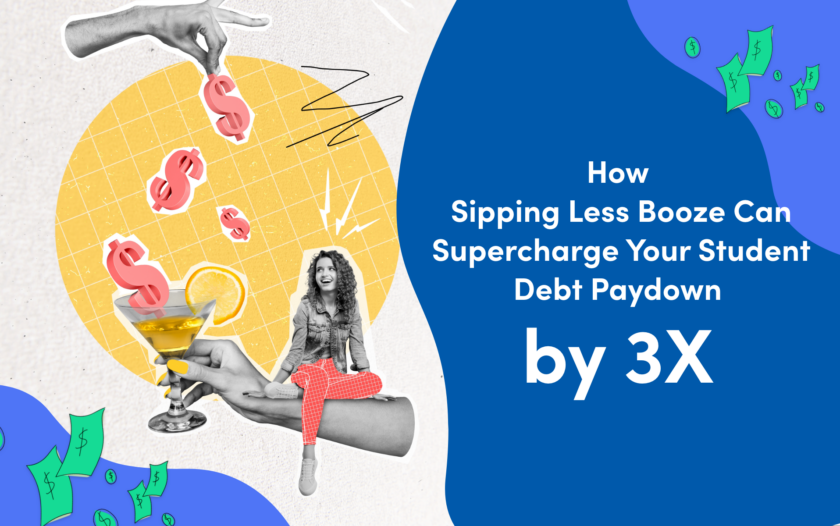Sipping Less Booze Can Supercharge Your Student Debt Paydown by 3X
About Anouare
Anouare is a seasoned writer, editor and content strategist who started her career as a lifestyle journalist before stepping into leadership roles at publications such as AskMen and Goalcast. From editorial strategy to content marketing and project-management, she has tackled various challenges in digital media and discovered her passion for mentoring others in the process. She loves a good money mindset book and believes you can create your dream lifestyle by being yourself.
Read full bio
Going to college is getting increasingly more expensive and Americans are feeling the burden of student debt.
The typical student loan is meant to be paid off in 10 years. But in reality, research shows it takes twice that time to pay off a student loan. If you’re looking to accelerate this process, Credello conducted research that revealed the surprising impact of alcohol consumption on debt repayment.
That’s right – drinking less can supercharge your student debt paydown if you were to take the money you spend on alcohol and invest it in the S&P 500 instead. Here’s what you need to know.
Average spend on alcohol
Reaching long-term financial goals requires taking a hard look at your budget. Wondering about the hidden cost of drinking on your finances? A survey conducted by The Harris Poll for TD Ameritrade and provided exclusively to USA TODAY showed that millennials spend about $300 a month on alcohol.
Credello analyzed what would happen if you took that money and invested it in the S&P 500 every month over the next 20 years. The results were shocking: it would take the average millennial only six years to pay off their student loan debt!
By year six, those $300/month deposits add up to $4,137.12 in savings. But if you invest $300/month into the S&P 500, the power of compound interest on your returns could translate into an average of $34,540.39 in your investment account – enough to clear that student loan debt.
Those findings make sense considering the rising price of alcohol. Data from the U.S. Bureau of Labor Statistics revealed that prices for alcoholic beverages are 621.31% higher in 2023 compared to 1952. On average, alcohol experienced an inflation rate of 2.82% per year, which means that alcohol costing $10 in 1952 would cost $72.13 in 2023.
You don’t even need to drink all that much to feel the impact of drinking on your wallet – all it takes is going out and having wine with your food or indulging in happy hour with your coworkers a few times a month.
Average student loan taken
Over the past 30 years, tuition costs at public four-year colleges grew from $4,160 to $10,740 and from $19,360 to $38,070 at private nonprofit institutions (adjusted for inflation), according to Forbes. Data from the Federal Reserve shows that the student loan debt now totals more than $1.77 trillion, a 66% increase over the past decade.
According to the Education Data Initiative, the average student loan debt currently sits at $37,338. Additionally, 20 years after starting school, half of the borrowers still owe $20,000 in student loan balances. Another Education Data Initiative report highlighted the financial toll of repaying those loans slowly: The average monthly student loan payment is $503, but the average student loan accrues $27,000 in interest alone over 20 years and up to 42% of the average borrower’s total cost of repayment is generated interest.
And let’s not even mention the emotional toll of not having much disposable income due to student debt repayments, but barely making a dent in your student loan balance.
The impact of reduced alcohol consumption
Cutting down on alcohol or going sober becomes tempting in light of those stats – it could be your ticket to financial freedom. Just take a look at the impact of saving $300 a month by buying less booze and investing that money into the S&P 500 over the years.
| Year | Deposits | Balance |
|---|---|---|
| 0 | $300.00 | $300.00 |
| 1 | $3,600.00 | $4,188.90 |
| 2 | $3,701.52 | $8,685.72 |
| 3 | $3,805.92 | $13,871.58 |
| 4 | $3,913.20 | $19,838.06 |
| 5 | $4,023.60 | $26,688.71 |
| 6 | $4,137.12 | $34,540.39 |
| 7 | $4,253.76 | $43,524.99 |
| 8 | $4,373.76 | $53,791.55 |
| 9 | $4,497.12 | $65,508.28 |
| 10 | $4,623.96 | $78,865.10 |
| 11 | $4,754.40 | $94,076.45 |
| 12 | $4,888.44 | $1,11,384.29 |
| 13 | $5,026.32 | $1,31,061.94 |
| 14 | $5,168.04 | $1,53,417.77 |
| 15 | $5,313.72 | $1,78,799.90 |
| 16 | $5,463.60 | $2,07,601.40 |
| 17 | $5,617.68 | $2,40,265.81 |
| 18 | $5,776.08 | $2,77,293.74 |
| 19 | $5,938.92 | $3,19,250.23 |
| 20 | $6,106.44 | $3,66,773.11 |
| 21 | $6,278.64 | $4,20,582.09 |
Bottom line
In other words, embracing a dry lifestyle is not only good for your health, but it could also bode well for your finances. As a student, your habits can make more of an impact than you think on your long-term financial situation, so it’s important to consider whether you really want to blow $100 on a night of drinking or if you’d rather invest that money in your future. Educating yourself about investing and making wise investment decisions is key too.









